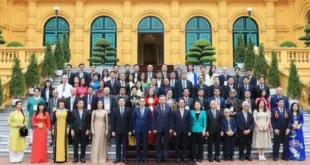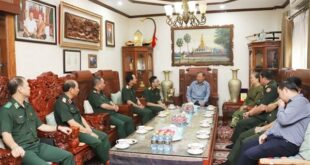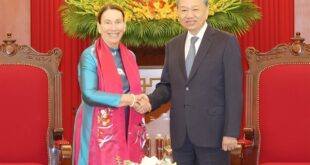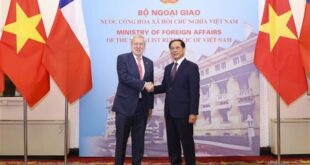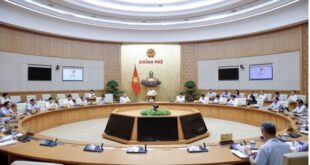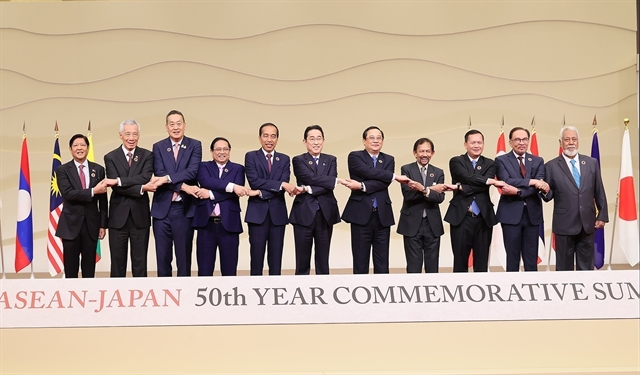 |
| Prime Minister Phạm Minh Chính (fourth from left) atnthe opening ceremony of the Commemorative Summit for the 50th Year of ASEAN-Japan Friendship and Cooperation in Tokyo on Sunday. VNA/VNS Photo |
TOKYO Prime Minister Phạm Minh Chính proposed ASEAN and Japan further strengthen strategic coordination and jointly promote the building of an open, inclusive, rules-based regional structure with ASEAN playing a central role.
He made the suggestion while addressing the ASEAN-Japan 50th year Commemorative Summit on Sunday in Tokyo.
Welcoming Japan’s contributions to the construction and development of the ASEAN community and its member countries, including Việt Nam, PM Chính affirmed that ASEAN – Japan is one of the most successful dialogue relationships in the bloc community.
He emphasised that in the context that the world and the region are experiencing many headwinds with unprecedented challenges, the two sides need to strengthen cooperation and strive to make the ASEAN-Japan comprehensive strategic partnership a symbol of international solidarity and cooperation.
To realise that goal, it is necessary to promote effective economic connection through digital transformation, green transformation of circular economy, knowledge economy, and jointly research and implement a number of specific cooperation projects that closely connect the vision of Japan, ASEAN, the Indian Ocean and the Pacific region, he said.
He hoped that Japan will continue to have a strong voice and action to support ASEAN’s common stance on the East Sea (internationally known as South China Sea).
The Prime Minister emphasised that the two sides need to foster investment in human factors, because people are the subjects, goals, driving forces and resources for the development of ASEAN-Japan relations.
He proposed the two sides boost economic and trade connections, effectively deploy the revised ASEAN-Japan Comprehensive Economic Partnership Agreement and trade agreements that both sides are members of while expanding cooperation in new fields, especially innovation, digital transformation, green economy, circular economy and smart agriculture, making these fields become new growth engines of the bilateral economic cooperation in the future.
He proposed Japan actively support Mekong sub-region countries to effectively respond to non-traditional security challenges and soon restart the Mekong cooperation mechanism.
He proposed Japan prioritise promoting projects that support sustainable development for the Mekong sub-region countries with the spirit of leaving no one behind.
The Prime Minister said socio-cultural cooperation and people-to-people exchange activities between ASEAN and Japan must be restored more quickly and strongly after the COVID-19 pandemic.
He welcomed numerous activities that have been organised to celebrate 50 years of friendly cooperation between ASEAN and Japan and more than 500 meaningful activities to celebrate 50 years of establishing diplomatic relations between Việt Nam and Japan.
PM Chính spoke highly of the common vision statement on ASEAN-Japan friendship and cooperation and the implementation plan that was approved by the leaders at the summit.
At the summit that closed on Sunday, leaders of Japan and ASEAN agreed to deepen their relations in economy and security.
In a “joint vision statement” issued after the summit, the leaders pledged to intensify collaboration in maritime security, strengthen supply chains, promote sustainable energy practices and expand people-to-people exchanges in various sectors.
The leaders reached consensus on stepping up dialogue and cooperation in the field of maritime security. The statement clearly said that Japan and ASEAN will strengthen dialogue and cooperation to maintain maritime security, safety, and order on the basis of the rule of law, including not hindering freedom and safety of navigation and aviation and commerce.
The two sides will improve awareness of the maritime field as well as cooperation between the coast guard and relevant law enforcement agencies, strengthen collaboration in building maritime capacity, and ensure disputes are solved by peaceful means, without using force or threatening to use force in accordance with widely recognised principles of international law.
They also agreed to cooperate in disarmament and non-proliferation of nuclear weapons, aiming for a world free of nuclear weapons.
In the socio-economic sectors, they will intensify connectivity through quality infrastructure investment, institutional and human resources development and exchange; and make efforts to improve supply chain sustainability, said the statement.
People-to-people exchanges will be enhanced in various fields, including culture and sports. In education, scholarship and student/teacher exchange programmes will be expanded.
They also announced the launch of a new initiative for the next-generation car industry aimed at mapping out strategies to enable ASEAN to continue being a major hub of auto production and exports.
“Based on strong mutual trust, Japan and ASEAN will tackle new challenges,” Japanese Prime Minister Kishida Fumio said at a press conference after the summit concluded, adding he is glad that they will take a “new step toward the next 50 years.”
Indonesian President Joko Widodo, who served as a co-chair of the summit, said Japan and the bloc will maintain peace and stability in the region while adhering to international law. VNS
- Reduce Hair Loss with PURA D’OR Gold Label Shampoo
- Castor Oil Has Made a “Huge” Difference With Hair and Brow Growth
- Excessive hair loss in men: Signs of illness that cannot be subjective
- Dịch Vụ SEO Website ở Los Angeles, CA: đưa trang web doanh nghiệp bạn lên top Google
- Nails Salon Sierra Madre
 VnExpress News The News Gateway of Vietnam
VnExpress News The News Gateway of Vietnam
